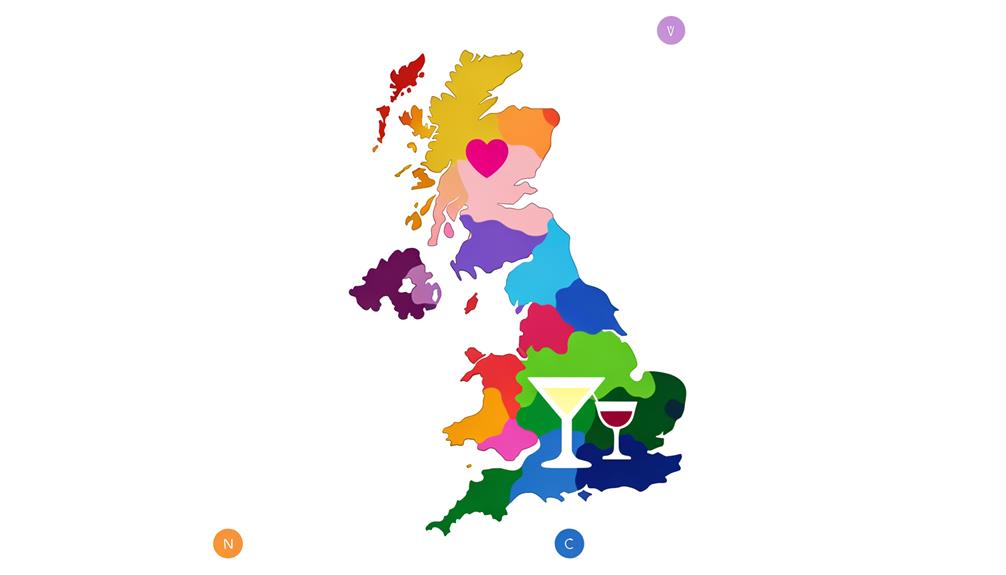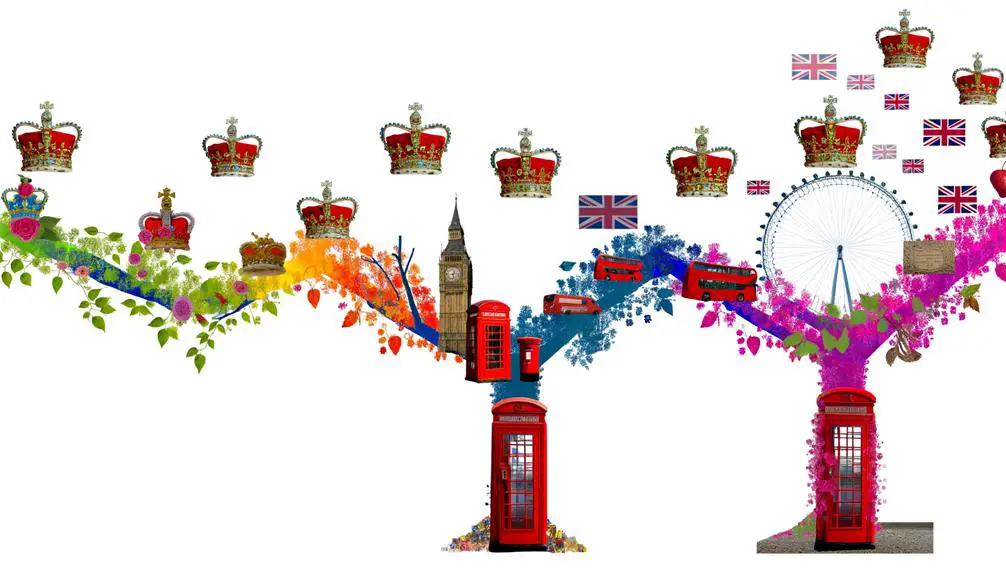In British slang, when you hear the word 'lush', it's talking about something that's incredibly appealing or luxurious in a sensory way. This term's roots trace back to the early 19th century, indicating luxury and opulence. Initially linked with lavish vegetation, its meaning evolved to signify richness, abundance, and high quality across various contexts, from cocktails to landscapes. Its usage showcases a linguistic journey from the literal to the figurative, enriching dialogues within British culture. This slang is celebrated for bridging tangible experiences with emotional resonances. Discovering its diverse applications and regional nuances reveals its linguistic depth and cultural significance.
Key Takeaways
- 'Lush' in British slang denotes something rich, abundant, or of high quality.
- It conveys approval and admiration, often used to describe sensory delights.
- Initially linked to opulence, it now spans various contexts beyond material wealth.
- Despite its broad application, it's especially popular in describing nature, food, and experiences.
- 'Lush' reflects cultural evolution, maintaining relevance and popularity across generations.
The Origin of 'Lush'

Tracing the etymology of 'lush' reveals its multifaceted journey from early 19th-century slang, primarily denoting luxury and opulence, to its contemporary usage in British vernacular as a term of endearment or to describe something exceptionally pleasing. This transformation showcases the dynamic nature of language, influenced by social, cultural, and linguistic factors over time. Initially, 'lush' was rooted in the lavish lifestyles of the elite, reflecting a world of excess and grandeur. However, as it permeated through various strata of society, its meaning evolved, becoming more accessible and broadly applicable.
Linguistic influences played a pivotal role in this evolution. The adaptability of English, with its propensity to borrow and blend from other languages and dialects, facilitated 'lush's migration from niche circles to mainstream vernacular. This journey from a symbol of extravagance to a colloquial expression of admiration or quality highlights the fluidity of language. It underscores how terms can shift in meaning, reflecting changing societal values and perspectives. Understanding 'lush' etymology provides insight into the mechanisms of language evolution, illustrating how words are not static but rather living entities that adapt to the contours of human experience.
Defining 'Lush'
Having explored the historical journey of 'lush,' let's now focus on its contemporary definition, examining how it encapsulates both a term of endearment and a descriptor for something exceptionally pleasing within British slang. Essentially, 'lush' refers to richness, abundance, and sensory delight, whether it's in the context of lush cocktails that tantalize the taste buds with their complexity and flavor, or lush gardens that immerse the senses in a tapestry of textures, colors, and fragrances. The term is deeply embedded in the vernacular, signifying approval and high quality.
To paint a clearer picture, consider the following table:
| Context | Description | Example |
|---|---|---|
| Lush Cocktails | Complex and flavorful drinks | 'That mojito was lush!' |
| Lush Gardens | Rich, vibrant outdoor spaces | 'Their backyard is lush.' |
| Social Situations | Describing enjoyable moments | 'Last night was lush.' |
| Compliments | Term of endearment or high praise | 'You look lush tonight.' |
| General Excellence | Anything deemed exceptionally pleasing or high quality | 'This cake is lush!' |
Analyzing 'lush' in these contexts demonstrates its versatility and enduring appeal in British slang, bridging tangible experiences with emotional responses.
Variations in Meaning

In exploring the variations in meaning, it's important to recognize how 'lush' adapts to different contexts, subtly shifting its connotation while retaining its core essence of quality and delight. The term 'lush', rooted in British slang, has garnered a spectrum of interpretations, influenced by regional dialects and social settings. Here are three key variations to ponder:
- Regional Variations: Depending on where you're in the UK, 'lush' might carry slightly different nuances. In some areas, it's exclusively positive, denoting something exceptionally pleasing or luxurious. However, in other regions, its usage extends to describe a richness that borders on excessive or overly indulgent, introducing a nuanced lush criticism that challenges its otherwise universally positive reception.
- Contextual Flexibility: The context in which 'lush' is used can dramatically alter its meaning. In a social setting, describing someone as 'lush' might imply attractiveness or charm, whereas in a critique of art or food, it could refer to an abundance of desirable qualities or richness in texture and flavor.
- Pronunciation Differences: The pronunciation of 'lush' can also hint at its intended meaning. A softer pronunciation might be used affectionately or to emphasize luxury, while a sharper, more pronounced delivery could suggest irony or critique, subtly altering its reception among listeners.
Understanding these variations requires an appreciation for the fluidity of language, especially slang, and how cultural and regional influences craft its evolving meanings.
'Lush' in British Culture
In exploring 'Lush' within British culture, you'll uncover its roots, shedding light on how history has shaped its current connotations. You'll learn about the contexts in which it's typically employed, highlighting the scenarios that most frequently give rise to its use. Additionally, examining regional differences reveals the nuances in its application across the United Kingdom, indicating a linguistic diversity that enriches its understanding.
Origin of 'Lush'
Delving into the etymology of 'lush' in British culture, one finds it's rooted in historical and social nuances that enrich its current usage. The term's journey from its origins to becoming a staple in British slang reveals a fascinating linguistic evolution. To understand this transformation, consider the following:
- Lush Etymology: Initially, 'lush' emerged from older dialects, where its meanings varied but generally leaned towards luxury or abundance.
- Language Comparisons: Comparing 'lush' with its counterparts in other languages showcases its unique cultural adaptation within the British lexicon.
- Historical Context: The word's adoption and adaptation over the centuries reflect broader social changes, impacting how it's perceived and used today.
Analyzing 'lush' through these lenses showcases the depth and complexity behind its seemingly straightforward usage in modern British slang.
Common Usage Scenarios
Within British culture, you'll find 'lush' frequently used across a variety of contexts, each reflecting the term's adaptability and nuanced meanings in everyday conversations. Its application spans from complimenting a sumptuously prepared meal to admiring someone's attractive appearance, showcasing its versatility. However, 'lush' isn't immune to criticism. Some argue that its overuse dilutes its impact, prompting a search for slang alternatives that convey enthusiasm or approval with fresher resonance. Analyzing its usage reveals a pattern where 'lush' serves not merely as a descriptor but as a linguistic tool that enriches dialogue, embedding a layer of warmth or admiration. Yet, the pursuit of linguistic diversity has led to the exploration of other terms, ensuring the vernacular remains vibrant and reflective of contemporary trends.
Regional Variations
One might find that 'lush' exhibits intriguing regional variations across the UK, each adding a unique flavor to its usage and interpretation. These variations are not just whimsical differences but are deeply rooted in the local dialectical influences and the process of slang adaptation, which varies markedly from one region to another.
- In Wales, 'lush' often carries richer emotional connotations, likely influenced by the poetic nature of the Welsh language.
- In South West England, particularly Bristol, 'lush' is used more liberally, describing anything from food to weather, showcasing a flexible adaptation of the term within local dialects.
- In London, the term is frequently blended with other slang, reflecting the city's dynamic linguistic landscape and its role in leading slang trends across the UK.
Usage Across the UK
You'll find that 'lush' exhibits intriguing regional variations across the UK, each with its own nuanced meaning and usage. The term's prevalence in popular culture has notably shaped its reception and adoption, particularly among the youth. Analyzing these dynamics offers a clearer understanding of how 'lush' functions not just as slang, but as a linguistic marker of identity and social trends.
Regional Variations Explained
Fascinatingly, the term 'lush' varies in meaning and usage across the UK, reflecting regional linguistic nuances and cultural distinctions. This diversity is shaped by dialectical influences and impacts international perceptions of British slang. To understand this variation, consider the following:
- In Wales, 'lush' often describes something exceptionally good or attractive, deeply rooted in local dialects.
- In South West England, it's broadly used in the same positive context but can also refer to lush landscapes, showcasing how environment influences language.
- In urban areas like London, 'lush' has been adopted into the lexicon with a broader, sometimes more generic, appreciation for quality or beauty.
These examples illustrate how regional differences enrich the tapestry of British slang, making 'lush' a versatile and colorful term within the UK's linguistic landscape.
Popular Culture Influence
As popular culture evolves, it greatly shapes the usage of 'lush' across the UK, reflecting shifts in linguistic trends and societal attitudes. Global influences and celebrity endorsements have played pivotal roles in embedding 'lush' into the vernacular, making it more than just a word—it's a reflection of contemporary British society.
| Factor | Impact on 'Lush' Usage |
|---|---|
| Global Influences | Broadened the term's appeal beyond regional confines, incorporating it into international dialogues. |
| Celebrity Endorsements | Amplified its popularity, as celebrities' usage signals trendiness and social acceptance. |
| Media Representation | Portrayed 'lush' in various contexts, reinforcing its versatility and relevance. |
| Internet & Social Media | Facilitated rapid dissemination and normalization of 'lush', blending it seamlessly into everyday language. |
These elements collectively mold 'lush' into a dynamic emblem of modern British slang.
Youth and Lush Usage
Across the UK, the term 'lush' has found a special resonance among the youth, reflecting their unique linguistic tastes and social interactions. This adoption into teen slang underscores a broader phenomenon of linguistic trends shaping how expressions evolve among younger demographics. Here's a closer look:
- Regional Variations: 'Lush' exhibits flexibility, with nuances in usage that vary subtly across different UK regions, showcasing the dynamic nature of teen slang.
- Communication Channels: Social media platforms have accelerated its spread, serving as incubators for the term's popularity among teenagers.
- Cultural Significance: Integrating 'lush' into their vocabulary, youths contribute to a living, breathing linguistic ecosystem, highlighting their role in the evolution of language.
This analysis underscores the intricate relationship between teen slang and linguistic trends, positioning 'lush' as a vibrant example of youth-driven language change.
Popular Phrases Featuring 'Lush'
You'll often hear the term 'lush' woven into various phrases that enrich the conversational tapestry of British English, each carrying its own nuanced meaning. When delving into lush criticism, understanding the context in which 'lush' is employed becomes crucial. Critics often point out that the overuse or misapplication of 'lush' can dilute its impact, leading to a search for lush alternatives that capture the essence of what is being described without losing the original's vibrancy. This search reflects a broader linguistic trend towards precision and specificity, moving away from generic praise to more descriptive and nuanced expressions.
In the domain of lush alternatives, phrases such as 'exquisitely detailed,' 'richly textured,' or 'vibrantly atmospheric' offer a more specific appraisal, catering to a more discerning linguistic palette. These alternatives not only provide clarity but also enrich the language, allowing for a more vivid and accurate portrayal of the subject at hand. The evolution of 'lush' within British English showcases the language's dynamic nature, reflecting societal shifts towards more mindful and articulate expression. This linguistic journey from lush criticism to the exploration of lush alternatives underscores the continuous interplay between language, culture, and individual expression.
Misunderstandings and Clarifications

The term 'lush's' frequent misinterpretation often leads to confusion, necessitating a thorough clarification to enhance understanding and avoid miscommunication. Language evolution and cultural perceptions play vital roles in shaping the meanings of slang, and 'lush' is no exception. Here's a breakdown of common misunderstandings and the clarifications needed:
- Language Evolution: Initially, 'lush' might evoke thoughts of abundance or even excessive drinking. However, in British slang, it has morphed to describe something exceptionally good or attractive. This shift underscores the dynamic nature of language and the importance of context in interpretation.
- Cultural Perceptions: What's considered 'lush' can vary greatly between cultures. A British person might use 'lush' to compliment a meal's quality, whereas elsewhere, the term might not carry the same connotation. Understanding this slang requires an appreciation of the cultural backdrop from which it emerges.
- Clarity in Communication: Due to its diverse interpretations, using 'lush' in conversation with those unfamiliar with British slang might lead to misunderstandings. It is imperative to gauge the listener's background and possibly provide clarification to make sure the message is conveyed as intended.
'Lush' in Media and Entertainment
How has the term 'lush' been portrayed in various forms of media and entertainment, and what implications does this representation have on its understanding and usage? The portrayal of 'lush' across media platforms is diverse, often oscillating between positive connotations of luxury and excess and negative associations with overindulgence. In the digital sphere, lush memes have proliferated, typically depicting scenarios or items that embody extravagance or sensory delight, thereby reinforcing the term's positive aspects. These memes contribute to a colloquial understanding of 'lush' that aligns with indulgence and high quality, echoing its British slang roots.
Celebrity endorsements have further shaped the term's reception, especially when public figures describe products, places, or experiences as 'lush'. Through such endorsements, 'lush' gains an air of credibility and desirability, linking it to lifestyles of affluence and taste. The technical implication of these portrayals is a nuanced understanding of 'lush'; it's not merely an expression of approval but a marker of sophistication and discernment.
The media's role in disseminating and shaping the term 'lush' underscores its evolving nature in contemporary lexicon, moving beyond its geographical origins to attain a broader, more nuanced application in everyday language.
The Evolution of Lush

Over time, 'lush' has undergone significant transformations in its connotations and applications, reflecting broader shifts in language and culture. This evolution is emblematic of the fluid nature of slang dynamics, where words morph and adapt in response to changing cultural perceptions and social contexts. To dissect the progression of 'lush,' it's crucial to ponder the following aspects:
- Historical Usage and Origin: Initially, 'lush' was rooted in descriptions of opulent, fertile landscapes, a demonstration of its sensory richness. This foundational meaning paved the way for its adaptation in slang, illustrating the linguistic journey from the literal to the figurative.
- Shift in Cultural Perceptions: As societal norms and values evolved, so did the application of 'lush.' What once was a term confined to the extravagance of nature expanded to encompass a broad spectrum of positive attributes, from aesthetic appeal to the quality of experiences, reflecting a more inclusive and diverse application in everyday language.
- Contemporary Relevance and Usage: Today, 'lush' encapsulates a blend of admiration and quality, used to describe anything from lavish environments to exceptional experiences and attractive individuals. This current usage underscores the term's adaptability and enduring appeal in the lexicon of British slang, highlighting its capacity to capture the zeitgeist of the era it inhabits.







